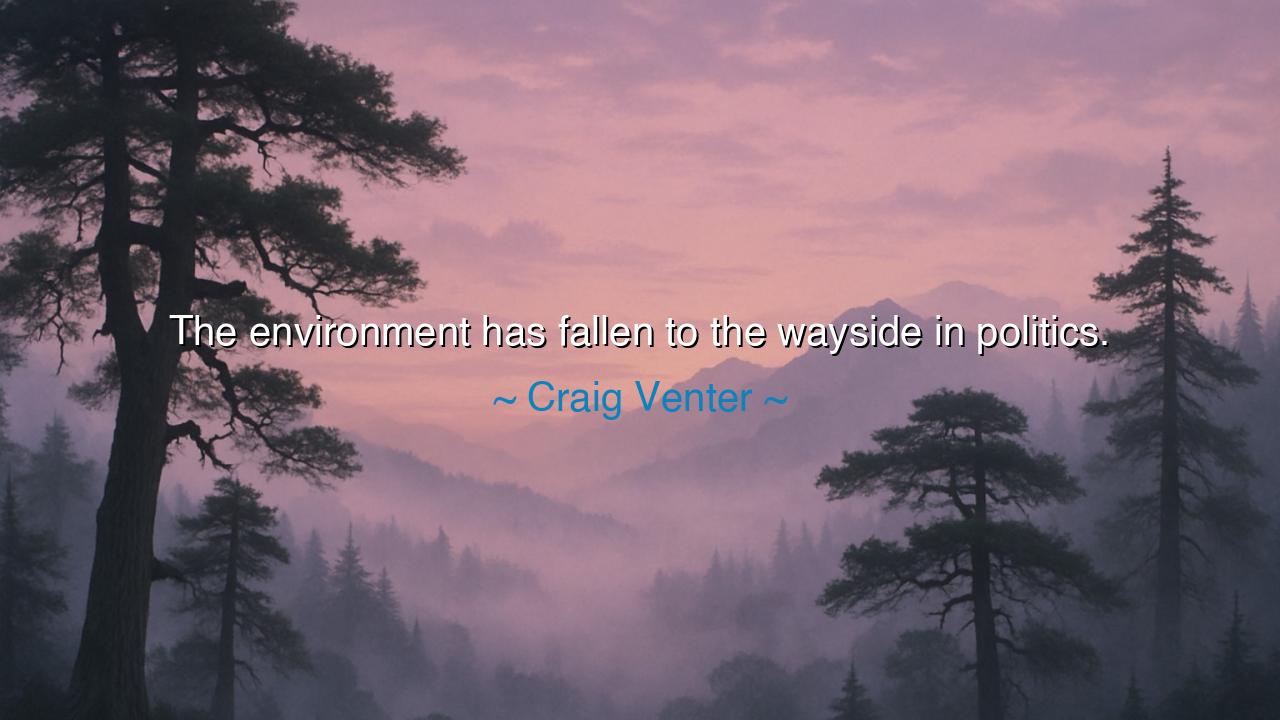
The environment has fallen to the wayside in politics.






In the council hall of our age, Craig Venter sounds a spare but solemn bell: “The environment has fallen to the wayside in politics.” The sentence is short, like a verdict written on a shard, yet it carries the weight of a generation. It tells us that the living world—the water that remembers our faces, the air that bears our breath, the soil that keeps our names—has been asked to wait outside while clamor over power and profit fills the chamber. Once, stewardship was spoken of as a noble duty; now, too often, it is an errand postponed until after the next election night. Thus the earth becomes a patient kept in the corridor while lesser complaints are tended first.
To say the environment has fallen to the wayside is to confess a failure of ordering. The ancients taught that wise rulers attend to foundations before frescoes, to wells before triumphal gates. But in our politics, spectacle outruns substance, and cycles measured in months ignore storms measured in centuries. Budgets arrive with holes where rivers should be; debates flare hot while forests burn hotter; pledges are made in spring and forgotten by autumn. The world does not hate us for this—she simply keeps her accounts, and interest compounds in flood, fire, and fever.
Yet history also gives lamps to light the path back. When the Cuyahoga River burned in 1969, a city watched flame bloom upon water, and a nation felt its conscience sting. Out of that shock came institutions and policy—the modern clean-water law, the birth of a national environmental guardian—proof that when the public will awakens, politics can remember its duty. Decades later, when the sky’s ozone grew thin, rivals signed a common oath—the Montreal Protocol—and the wound began to knit. These chapters are not myths; they are receipts showing that attention, once paid, yields dividends in health and hope.
Why, then, do we forget? Because the rewards of neglect are immediate and loud—cheaper extraction, easier votes—while the rewards of care are gradual and quiet—fewer asthma nights, gentler rivers, mornings without smoke. Politics too often chases applause’s echo rather than the earth’s steady metronome. So the environment slides from agenda to margin, from margin to footnote, from footnote to silence, until a crisis drags it, coughing, back to the center. This is the rhythm Venter names, and it is a drum we must refuse.
The origin of the warning lies in the witness of those who measure life’s machinery—genomes and oceans, microbes and reefs—and see how policy choices write themselves into bodies and biomes. Scientists bring charts like prophets once brought parables; both are invitations to repent and repair. But summons without structure fades. We need policy tuned to reality’s laws: laws of chemistry and physics, of watersheds and winds, of incentives that move markets as surely as gravity moves tides.
What, then, shall we do? First, restore the order of cares: put air, water, soil, and biodiversity at the beginning of the agenda, not the end. Tie budgets to baselines—monitor what we treasure, not merely what we tax. Make long oaths binding on short terms: sunset clauses paired with mandatory reviews; standards that outlive the ministers who sign them. Shield the watchmen—data, auditors, inspectors—from the weather of partisanship. And braid jobs to stewardship, so that thriving ecosystems and thriving households become the same sentence.
And here are practices as plain as bread: vote for leaders who publish measurable environment targets and report on them quarterly; buy and build with durability in mind; let cities plant windbreaks and wetlands the way they once laid rails; require clean procurement up and down public contracts; teach children the names of local birds and the meaning of a watershed, that affection may anchor duty. Join the quiet armies—restoration crews, citizen scientists, neighborhood energy co-ops—whose patient work turns promises into habitats. For when the environment stands in the center of politics, our laws become a form of love, and the future, which has no vote, is finally represented.
Take Venter’s line as a summons, not a dirge. Lift the earth from the wayside and set her back at the table where the great decisions are made. Let our politics remember its first purpose: to keep a people and their place alive together. Then policy will sound like prayer with plans, and the land will answer—not with fire on water, but with clear mornings, durable harvests, and children who breathe easy in the houses we are building for them now.






AAdministratorAdministrator
Welcome, honored guests. Please leave a comment, we will respond soon